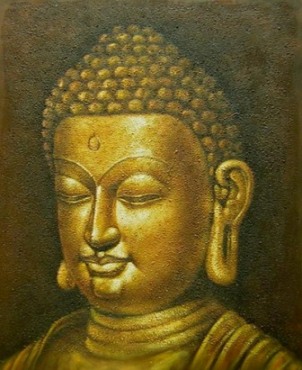Osho : We are all suffering from eye diseases. This is just symbolic. Not that we use specs – those eyes are not what is meant. Even a blind man suffers from eye diseases and he has no eyes. These eyes, these visible eyes are not what is meant.
The world that we create around us is created through our eye diseases. We go on looking wrongly, we go on dividing. The universe is one, but our eyes go on dividing. That division is the disease. The existence is just as it is. We go on condemning or appreciating, that is the eye disease. We go on judging. Facts are just facts, there is no way to judge.
One Zen monk, Bokuju, was passing through a street in a village. Somebody came and struck him with a stick. He fell down, and with him, the stick also. He got up and picked up the stick. The man who had hit him was running away. Bokuju ran after him, calling, ”Wait, take your stick with you!”
He followed after him and gave him the stick. A crowd had gathered to see what was happening, and somebody asked Bokuju, ”That man struck you hard, and you have not said anything!”
Bokuju is reported to have said, ”A fact is a fact. He has hit, that’s all. It happened that he was the hitter and I was the hit. It is just as if I am passing under a tree, or sitting under a tree, and a branch falls down. What will I do? What can I do?”
But the crowd said, ”But a branch is a branch, this is a man. We cannot say anything to the branch, we cannot punish it. We cannot say to the tree that it is bad, because a tree is a tree, it has no mind.”
Bokuju said, ”This man to me is also just a branch. And if I cannot say anything to the tree, why should I bother to say anything to this man? It happened. I am not going to interpret what has happened. And it has already happened. Why get worried about it? It is finished, over.”
This is the mind of a sage – not choosing, not asking, not saying this should be and this should not be. Whatsoever happens, he accepts it in its totality. This acceptance gives him freedom, this acceptance gives him the capacity to see. These are eye diseases: shoulds, should nots, divisions, judgments, condemnations, appreciations.

The world to us is a representation of the experiences that we have, no one else can have these experiences, therefore they pertain only to us. Our comprehenson of these experiences is how we see the world around us, if we sit in subjective condemnation, and in our mind our experiences are affecting all things, then we fail to sit in objective observation, we fail to accept things as they are and we cloud our mind from the baalnce of universal intelligence, we fail to be as one with all things, we fail to be the master, we fail to be as buddha.
This is when we judge others, this is when we seperate ourselves from others, and it is based on our experiences not theirs, it has only to do with our inability to accept things as they are without judgement of them, without seeing them one with all else, this is to exsist in egocentricity.
When we judge others we are using a trick of the mind, a trick known as self deception, there are 9 forms of this trick and the mind is very cunning at using them when we are unaware of ourselves. The mind will use these tricks to hide from our awareness the things that are offending us because of our subjective awareness of our own experiences.
To sit in judgement of others is to project our own subconsciously and unconsciously percieved fears and inadequacies upon others. Instead of accepting our experiences for what they are we condenm others, seperate them from ourselves in a vain attempt to protect ourselves from ourselves. This is a person that does not know themself, this is a person that sees in others the things that they themself cannot accept within them.
Bokuju was accompanied by a student and the student asked Bokuju why he was not offended by the attacker and the master asked the student ‘Why should I be offended by the actions of others, these were his actions not mine, it is not upon me to be offended, it had nothing to do with me.’